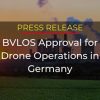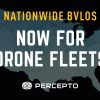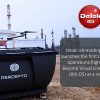Below the radar of the public eye, drone technology is radically changing the way insurance companies mitigate risk and process claims.
The insurance industry has quietly turned into one of the earliest widespread adopters of drone-based technology. In an ever-tougher insurance climate – wherein both regulatory, competitive and environmental pressures are on the rise – drones are offering insurers a cost-effective way to mitigate risk pre-loss, along with better process claims and fraud protection post-loss.
Pre-Loss Risk Mitigation
At the pre-loss phase, drones are helping insurers better understand risks to sites and assets.
For example, drones are being used to conduct pre-coverage property surveys that can cost-effectively assess the actual risks to property from threats that are hard to identify from the ground. Whether for individual property surveys or wider-scale government-sanctioned regional surveys (for example, areas prone to natural disasters), drones enable more precise risk management and more competitive and tailored pricing.
More granularly, autonomous drones with infrared cameras and other sensors can automatically detect ongoing maintenance issues such as water and air leaks at industrial and other sites. This helps site owners keep insurance premiums in check by enabling more effective, more frequent preventative maintenance.
Fraud Protection
Some 10% of property insurance losses result from fraud, adding up to a staggering $34 billion each year in the US alone. Drones can be used to mitigate these losses by quickly inspecting claims sites immediately after First Notice of Loss to check claim accuracy, extent and validity or to retrieve previous inspections to confirm best practice has been kept.
Drones are also used to counter personal/medical insurance fraud. For example, a New York private investigator hired by insurers used a drone to capture images of a man claiming to be disabled engaged in heavy physical activity.
Claims Processing
Leveraging drones, insurers can transition from time- and resource-intensive manual property inspections, to faster and more efficient aerial-based data collection. This streamlines claims preparation for customers, and reduces settlement time dramatically – literally from days to hours. Moreover, drones enable insurers to optimize the deployment of field adjusters and other specialized, high-skill resources.
By way of example, following Hurricane Florence in 2018, drones were in high demand owing to their ability to quickly collect crucial claims data, even from places inaccessible by ground transportation. Demand was so intense that the Federal Aviation Administration (FAA) granted a temporary waiver to US insurer State Farm, allowing that company to operate drones on longer range flights and above people – something it would not have been allowed to do under then-current regulations.
The Bottom Line
Just as CCTV has become a standard (and indispensable) pre- and post-loss insurance tool, so too are drones. Routine aerial data collection – easily achieved with autonomous drones – is taking its rightful place for claims investigation, fraud prevention, and risk mitigation. Forward-thinking insurers are starting to encourage companies and individuals to adopt drone-based data collection solutions – incentivizing with discounted insurance and expanded coverage.
As autonomous drone technology advances and regulations permit drone operations beyond line-of-sight, insurance companies will be able conduct even faster, easier and more productive claim investigations – examining root causes, evaluating infrastructure ahead of insurance, and more. And organizations such as heavy industrial companies will find it easier, less cumbersome and much faster to prepare and prove claims…





